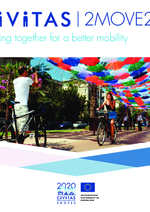Implementation of a strategic campaign for electro-mobility
Summary
The measure aims to promote clean energy-efficient vehicles and transport systems in Stuttgart. It foresees information events in the field of e-mobility in city districts of Stuttgart and for specific target groups as well as the integration of e-mobility in the city planning process. In terms of results, the City of Stuttgart seeks to promote public awareness regarding e-mobility and to increase the use of e-mobility vehicles among citizens.
Implementing sustainable mobility
Due to its unique topography, Stuttgart has severe problems with air quality and noise in some areas of the city centre. There is a broad strategy to reduce emissions, but results are limited because of the high number of cars that enter and leave the city every day. The city administration is implementing a strategic campaign for electro-mobility in the framework of 2MOVE2 in order to improve air quality and reduce noise emissions in the city. Currently, Stuttgart provides a comprehensive charging infrastructure for two- and fourwheelers with more than 500 charging points all over the city. However, people still don’t buy or use e-vehicles in a significant number. For this reason, the measure aims at bringing e-mobility into the daily life of people through a decentralised campaign for public awareness on e-mobility in city districts. The municipality of Stuttgart has been organising several public information events in selected city districts and additional public events for special target groups (elderly people, students, migrants).
The events include presentations from experts on e-mobility, in addition to discussions and testing of different e-vehicles. As the topography in Stuttgart with more than 300 meters of difference in altitude makes the use of conventional bicycles difficult, electric bicycles (Pedelecs) are an attractive alternative transport mode, especially for elderly people and commuters. Young people are also a target group of the campaign since they can be encouraged to use a Pedelec.
E-mobility implicates new requirements for the urban planning process, e.g. charging facilities in public spaces and privately funded shopping malls or housing complexes, parking, linkage to public transport and inter-modal chains. For this reason, the City of Stuttgart decided to develop a concept which provides guidelines for city planners on how to integrate e-mobility at an early stage in the planning processes.
Objectives
- Raising awareness of e-mobility among citizens, especially elderly people, students, and migrants
- Inclusion of e-mobility in the overall city development planning
Progress
 The City developed a plan for events from 2014 to 2016. Several activities for target groups have been realized yet. In total, 12 target group specific events have been offered for language schools, youth organisations and elderly people in Stuttgart. Three public information events took place in the city districts of Stammheim, Zuffenhausen and West. These events included a theoretical part and a practical part with testing of electric bicycles and demonstrations of the call-a-bike sharing and the car2go free floating systems. During the International Cities for Mobility Congress a cargo bike event for citizens, municipal technicians and the participants of the congress took place.
The City developed a plan for events from 2014 to 2016. Several activities for target groups have been realized yet. In total, 12 target group specific events have been offered for language schools, youth organisations and elderly people in Stuttgart. Three public information events took place in the city districts of Stammheim, Zuffenhausen and West. These events included a theoretical part and a practical part with testing of electric bicycles and demonstrations of the call-a-bike sharing and the car2go free floating systems. During the International Cities for Mobility Congress a cargo bike event for citizens, municipal technicians and the participants of the congress took place.
Concept for integration of e-mobility in urban planning process
A mobility expert was contracted to elaborate a concept for the inclusion of e-mobility in the urban planning processes in Stuttgart. It will be used as a guideline for the municipal departments which are involved in the planning processes. The concept is based on a recently published DIFU (German Institute on Urban Affairs) publication dealing with e-mobility and urban planning, and shall be disseminated (brochure in English and German) among European cities, especially within the CIVITAS community providing basic guidelines. To implement this concept in the urban planning process in Stuttgart in October 2016 a workshop is planned with all municipal departments involved in planning processes dealing with e-mobility.
Outcomes

- Information and test events on e-mobility were successfully organized:
- 12 workshops for in total 100 students and migrants of four language schools and one municipal enterprise,
- information events in three city districts, and
- cargo bike event for citizens, municipal technicians and the participants of the International Cities for Mobility Congress.
- A network for stakeholders from private sector and research was created thanks to the information events.
- A comprehensive concept for the inclusion of e-mobility in the urban planning concept was developed. A brochure on the concept is available in English and German.
- A workshop on the inclusion of e-mobility in urban planning and environmental processes will be organized for technicians of the municipality of Stuttgart in October 2016.








